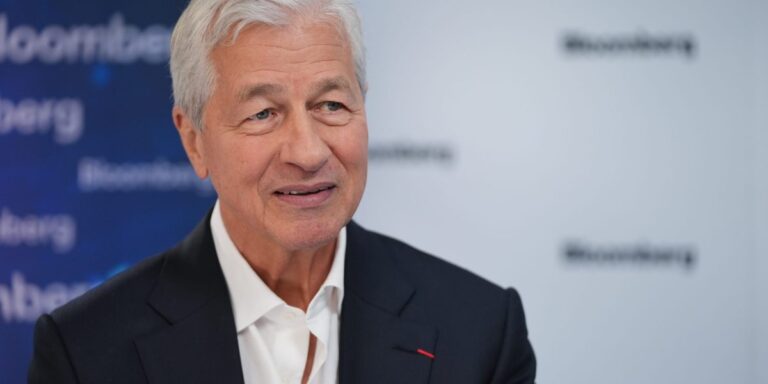
Jamie Dimon got all the attention on Wall Street on Monday. In a series of public remarks made at the JPMorgan Chase conference Investor Day, Dimon painted a bearish image of the global economy and suggested his retirement is closer that many had predicted.
During his speech, a worried Dimon issued a long list of warning signs about the global economy: inflation that shows no sign of going away, a US government prone to excessive spending and a geopolitical landscape that is among the most unstable things he had ever seen.
In addition to this macroeconomic uncertainty – which is notable if it worries a firm hand like that of Dimon – the mention of his possible retirement risks unbalancing the company he has run for 18 years. The prospect of a JPMorgan without Dimon at the helm is daunting enough, but it’s even more so when you consider how unstable the economy currently is. In his speech, Dimon warned of potential threats he had highlighted in the past, paving the way for worrying prospects more dire than the sum of its parts.
“I am cautiously pessimistic”, Dimon said.
At Dimon’s succession planning has received a lot of attention from investors, employees and observers. During his tenure, Dimon built JPMorgan into the nation’s largest bank, overseeing a vast financial services empire. As such, the prospect of him not being around to run the company has many stakeholders wondering what its future might look like without him — and on Monday, he hinted that that eventuality might be closer provided that.
“The timeline is no longer five years,” Dimon said at the New York-based bank’s annual investor meeting.
In the past, Dimon has repeatedly said he plans to retire within five years so much so that it has become a running joke in financial circles.
“My statement remains the same, it’s been five years,” Dimon said in 2020 when asked when he planned to resign. “When and if we ever set an actual retirement date, we will let you know.”
But many times these five years passed and he remained in the top position. Just a year ago, Dimon said he had little interest by resigning because he felt his “intensity is the same”. He reiterated that point Monday, while suggesting his usual five-year deadline had been shortened. JPMorgan Stock plunged 4.5% Monday after the news. Bank of America said the revelation sent JPMorgan shares tumbling due to “investor anxiety over the issue.”
On Tuesday, the stock had recovered slightly, but remained below Monday’s high.
JPMorgan’s ‘good candidates’ for CEO
Now, Dimon and the JPMorgan board appear to be approaching succession planning with particular care. If Dimon were to step down as CEO, it’s likely he would remain chairman of the board of directors. When reached for comment, a JPMorgan spokesperson emphasized Fortune to Dimon’s comments on Monday, in which he responded “we’ll see” if he would remain president.
When it comes to succession planning, Dimon alluded to the strong talent pool JPMorgan has. “The whole operating committee…they all know every part of the business,” Dimon said. “How many companies can say that?
Others took note as well. In an analyst note, UBS said there were “a number of strong candidates with extensive experience within the bank.” Two of the pioneers—Marianne Lake, current CEO of JPMorgan’s consumer bank, and Jennifer Piepszak, who heads the commercial and investment bank, launched their new roles in January, offering them the various experiences praised by Dimon. “We believe investors view Piepszak and Lake as likely among the top contenders for the position, when the time comes,” UBS said.
Keeping a Close Eye on the Economy
In recent months, Dimon said many macroeconomic indicators worried him. He was particularly concerned about national debtwhich he considers to be a financial time bomb for the United States
“Somewhere along this journey — and I don’t know if it’ll be six months, six years or 16 years — it’s going to be a problem,” Dimon said. said during the investor day.
Growing national debt goes hand in hand with persistent inflation and reduction in excess savings for consumers and small businesses alike – two problems that, according to Dimon, global institutions have not hesitated to address. Just last week he was insist on inflation, saying analysts overestimated its rigidity. “The chances of inflation remaining high or rates rising are higher than people think,” Dimon said Bloomberg.
All of this comes against a geopolitical backdrop that worries Dimon to a degree he has never felt before in his career. The war in Ukraine rages on, conflicts in the Middle East show no signs of slowing down – in fact they appear to be escalating – and tensions between China and the United States risk escalating into a full-blown trade war.
“This may be the most dangerous time the world has seen in decades,” Dimon said in October, less than a week after the Hamas attacks in Israel that sparked the ongoing war.
Whoever succeeds Dimon will have to deal with the litany of problems he says the world will face. And while that may be a tall order, he leaves behind a strong company with diversified business lines and an enviable balance sheet brimming with cash.
“What is easier to predict is that Mr. Dimon will hand over a blue-chip global banking franchise that has proven itself over multiple cycles to his successor,” Bank of America said in its analyst note.


